Vanishing Lake Chad — A Water Crisis in Central Africa
Once the third-largest source of freshwater in Africa, Lake Chad is disappearing according to new satellite images — putting millions of people in four Central African countries at risk of losing their primary water supply.
The vast shallow lake, with a surface area equivalent to Lake Erie only 40 years ago, is now one-twentieth its previous size. The region surrounding the basin continues to suffer from intense, long-standing drought choking-off the lake’s water supply.
Historically, the lake has varied greatly in volume due to its shallow bottom and large surface area. In the dry season, Lake Chad becomes mostly a large marsh, which then recharges on average to a 5 feet (1.5 meters) deep lake with the return of the monsoons. At its documented peak, the lake was only about 23 feet (7 meters) deep.
[flv:lake_chad.flv 551 600]
The shrinking lake has had a substantial impact on the local populations, as entire communities have switched from a fishing-lifestyle to one of farming and agriculture. Local communities that once ringed the shores of the lake are now isolated villages — miles from water — and these populations have literally begun farming the now-dry lake bottom. Much like the drying of Uzbekistan’s Aral Sea, the impacts are far-reaching and complex.
Jonathon Foley and Michael Coe of the University of Wisconsin, Madison, found that while the drought has caused significant declines in water levels, human factors are mostly to blame for the present levels.
In their paper, published in the Journal of Geophysical Research, Foley and Coe concluded that increased demands on the water resources flowing into the lake, and withdrawals from the lake itself, have prevented Lake Chad from returning to its pre-sixties size.
As the Sahara slowly encroaches on the lake, the local populous has come to depend on the rivers flowing into the basin more and more. The diversion of this water to support a population of some nine million herdsman, farmers and fishermen has exacerbated the effects of drought.
In an interview with National Geographic, Foley warned that “[t]he problem is expected to worsen in the coming years as population and irrigation demands continue to increase. It shows how vulnerable our water resources can be.
“There are enough people in the world now that we need to start planning and looking at fresh water as a finite resource or we’re going to be in trouble. We don’t get any more.”
Plans are in the works to divert water from the Congo River to the River Chari, which flows into Lake Chad, and revitalize the lake. The ambitious project would construct some 60 miles of canals and pump water uphill toward Lake Chad, but it is unclear when the diversion project would begin or who would fund it.
Lake Chad, which lies on the boarders of the African nations of Chad, Cameroon, Niger and Nigeria, supports a vast ecosystem of waterfowl, crocodiles, fish, shore birds, and grazing animals.
The recently released satellite images combined with older images (see graphic) show the desertification occurring in the Lake Chad basin. All images were compiled when the lake was at its seasonal peak.
References and Additional Resources:
Africa: Atlas of our Changing Environment (UNEP)
EarthShots: Satellite Images of Environmental Change (USGS)
Shrinking African Lake Offers Lesson on Finite Resources (National Geographic)
Slow death of Africa’s Lake Chad (BBC)
Shrinking of Lake Chad: Tale of Human Abuse, Climate Change (Global Policy Forum)
Case study on river management: Lake Chad (WWF)
Circle of Blue’s east coast correspondent based in New York. He specializes on water conflict and the water-food-energy nexus. He previously worked as a political risk analyst covering equatorial Africa’s energy sector, and sustainable development in sub-Saharan Africa. Contact: Cody.Pope@circleofblue.org

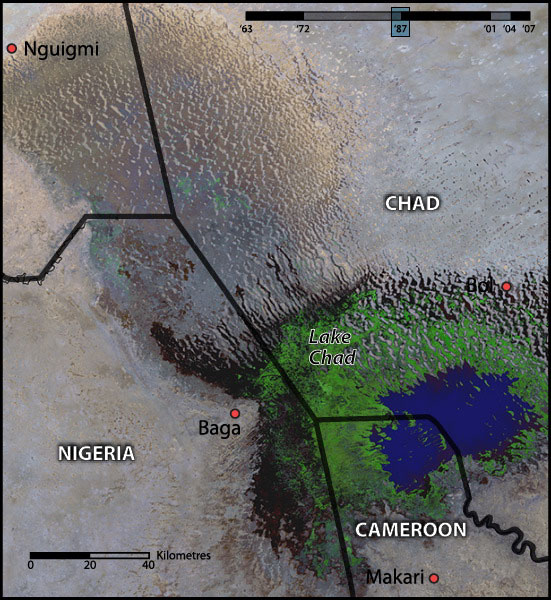
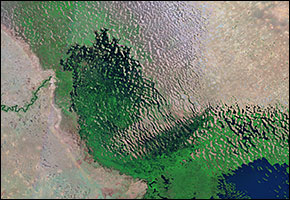

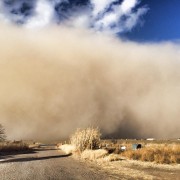
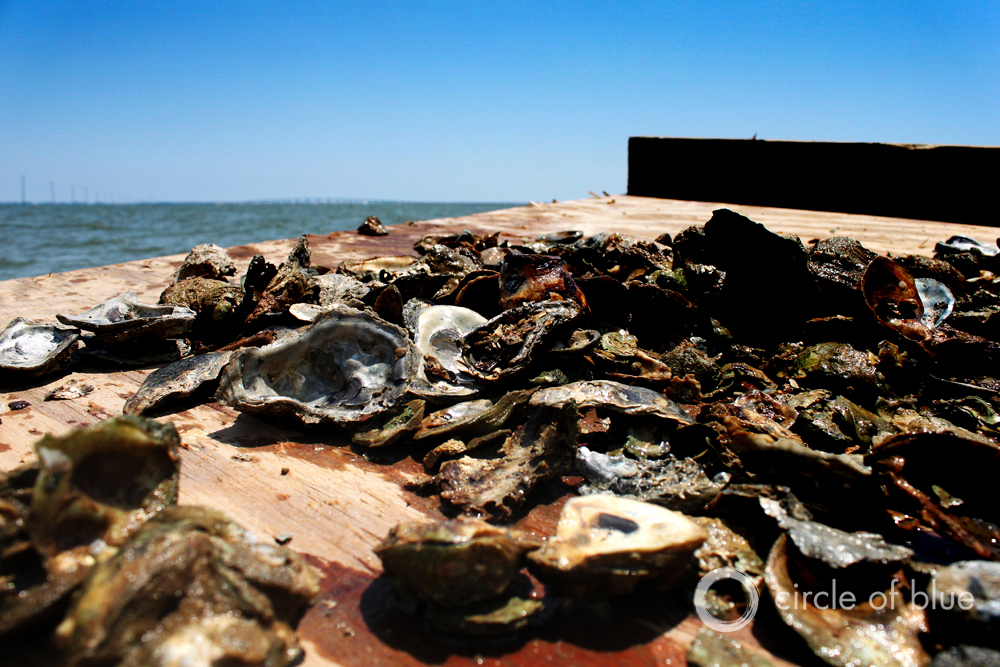
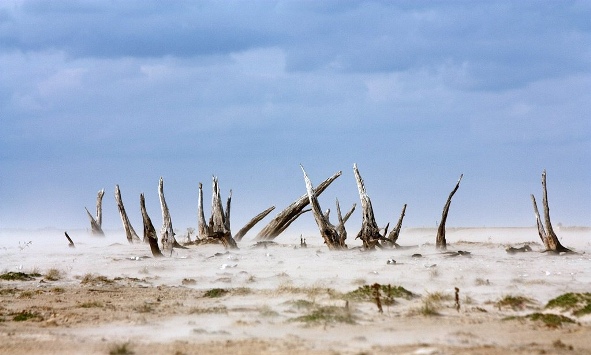

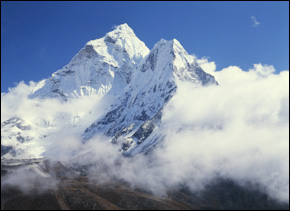

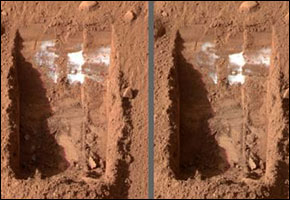
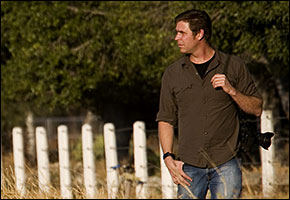
I am from Chad but live currently in the States. This issue is very important and needs to be educated to the people of Chad, Niger, Nigeria and Cameroon. We need to do something..if there is anything I can do..anything please email me.
I graduated from SFSU with a International Relations degree. My main goal always is to go back to Africa and make a difference. Anything I can do, I will do.
Please let me know.
hawa
The unmentioned factor in Lake Chad’s demise is the gigantic infestation of Typha Australis that is sucking out all the water from the lake and its tributaries. There are literally millions of hectares of this plant, raising the evapotranspiration rate by a factor of more than 4, and silting up lakes and streams until they no longer function. Worldwide, aquatic weeds are a major factor in desertification. Their clearance in Africa would solve many other problems as well (malaria, flooding, Quelea…). The resilience of these weeds makes their control a never ending task. A never ending task requires a profit to sustain it. That profit is available in energy. Typha is an excellent biofuel feedstock, and harvesting it makes an immediate improvement in your water picture. The silt it has built up must also be harvested, and used for soil rehabilitation or to fight coastal erosion. Otherwise, the cleared streams and lakes will still not be really viable. This is a terrifyingly renewable resource that is causing trouble everywhere. When time and money permit, what is being harvested should be checked for fitness for human consumption. Aquatic weeds collect toxins. Otherwise, the infestation in Lake Chad could feed every African a loaf of bread every day. Help me save the world From and With (With and From) cattails.
Global Warming Apocalypse is Approaching! Over 50 years ago Scientist warned us of what was coming. But we’ve refused to act quickly. Now we’re getting closer and closer to the point of no return. It will began with the drought, fires, superstorms, sea level rise, floods, blackouts, oil spills, famine and plagues. And ends with the breakdown of societies, violence, economic collapse, global conflict and world war. A global heat wave is returning in 2010 to 2014, The arctic ice cap is melting very faster at alarming rated, it will be all ice free in the summer of 2012. The ozone layer is still depleting from our man made chemicals of CFC’s. There will be more ecological disasters in the years to come. I from Roosevelt, New York, and please go to the websites at: http://www.suprememastertv.com, http://www.stopglobalwarming.org, http://www.evaneco.com and http://www.globalzero.org.